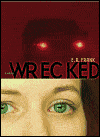 One of the saddest things human beings endure is death of a loved one. While the idea of our own death may frighten and sadden us, living through the death of someone else, someone close to us, is the saddest thing of all. So imagine Anna’s pain when she awakes from the horrific car accident she was in with her friend Ellen to discover that Ellen is alive—but the girl in the other car, the car that hit them—that girl is dead. That girl was Cameron Polk. Anna’s brother’s girlfriend. Now Anna is questioning everything about herself and her life. The accident wasn’t her fault, but will she ever be able to think of herself as anyone but the girl who killed Cameron? And what must her brother be feeling? Does he hate her? How can he not? Thoughts like these whirl through Anna’s head constantly after the accident, and if she tries to drive or hears someone scream, she immediately finds herself brought right back to that terrible night. With the help of a caring therapist named Frances, Anna discovers she has Post Traumatic Stress Disorder. Frances introduces Anna to a new kind of therapy called Eye Movement Desensitization and Reprocessing (EMDR) which allows Anna to internally watch movies of her life stream by and she just has to notice how those memories tie into her feelings about the night of the accident, her brother, and somewhat surprisingly, her feelings about her domineering father. As Anna makes her long journey back from that night, she discovers that there is so much more to her and her relationships with her family and friends than she ever imagined. This is a story of immense grief. But it is also a story of redemption, love and hope, the way only one of my all time fav authors E.R. Frank can tell it. “Mostly you realize you can handle it. You’d rather turn it upside down and dump it out…You’d rather do that, because you don’t want to have to handle it…But you do handle it. Because the thing you learn is that you can.” (2 weepies)
One of the saddest things human beings endure is death of a loved one. While the idea of our own death may frighten and sadden us, living through the death of someone else, someone close to us, is the saddest thing of all. So imagine Anna’s pain when she awakes from the horrific car accident she was in with her friend Ellen to discover that Ellen is alive—but the girl in the other car, the car that hit them—that girl is dead. That girl was Cameron Polk. Anna’s brother’s girlfriend. Now Anna is questioning everything about herself and her life. The accident wasn’t her fault, but will she ever be able to think of herself as anyone but the girl who killed Cameron? And what must her brother be feeling? Does he hate her? How can he not? Thoughts like these whirl through Anna’s head constantly after the accident, and if she tries to drive or hears someone scream, she immediately finds herself brought right back to that terrible night. With the help of a caring therapist named Frances, Anna discovers she has Post Traumatic Stress Disorder. Frances introduces Anna to a new kind of therapy called Eye Movement Desensitization and Reprocessing (EMDR) which allows Anna to internally watch movies of her life stream by and she just has to notice how those memories tie into her feelings about the night of the accident, her brother, and somewhat surprisingly, her feelings about her domineering father. As Anna makes her long journey back from that night, she discovers that there is so much more to her and her relationships with her family and friends than she ever imagined. This is a story of immense grief. But it is also a story of redemption, love and hope, the way only one of my all time fav authors E.R. Frank can tell it. “Mostly you realize you can handle it. You’d rather turn it upside down and dump it out…You’d rather do that, because you don’t want to have to handle it…But you do handle it. Because the thing you learn is that you can.” (2 weepies)
A Time for Dancing by Davida Wills Hurwin
 Samantha and Julie aren’t just best friends; they’re soul mates. They’ve been having sleepovers and dancing ballet together since they were little. So when Julie gets cancer, it feels like it’s happening to Samantha, too. Told in alternating chapters from both friends’ point of view, this book not only provides a frighteningly real picture of what it is like to watch your best friend go through hell, but also what it is like to experience first-hand through Julie’s eyes the stages of loss–fear, denial, hope and finally painful acceptance that life may be ending just as it is supposed to be beginning. This is a step up from Lurlene McDaniel’s soapy series books about terminally ill teens. This is a story with such real characters and feelings that it almost feels like you’re losing Julie, too–just when you’re starting to get to know and love her. (4 weepies)
Samantha and Julie aren’t just best friends; they’re soul mates. They’ve been having sleepovers and dancing ballet together since they were little. So when Julie gets cancer, it feels like it’s happening to Samantha, too. Told in alternating chapters from both friends’ point of view, this book not only provides a frighteningly real picture of what it is like to watch your best friend go through hell, but also what it is like to experience first-hand through Julie’s eyes the stages of loss–fear, denial, hope and finally painful acceptance that life may be ending just as it is supposed to be beginning. This is a step up from Lurlene McDaniel’s soapy series books about terminally ill teens. This is a story with such real characters and feelings that it almost feels like you’re losing Julie, too–just when you’re starting to get to know and love her. (4 weepies)
Love, Sara by Mary Beth Lundgren
 Sara knows what it’s like to be an outsider. After all, she’s been in foster care most of her life and has just recently become part of a family that she loves and hopes will adopt her. It helps that her best friend Dulcie is also adopted and knows what it feels like. The two of them share everything, including their low-key status at school. But all that changes when the star of the football team suddenly notices Dulcie’s quiet beauty. Soon Dulcie’s caught up in a hot romance, leaving her best friend in the dust and Sara finds herself alone–again. But when Dulcie gets pregnant and she and her boyfriend are turned out by their parents, Sara is the only person that Dulcie can turn to. But can Sara convince Dulcie that the final solution she and her boyfriend have planned to escape their problems isn’t tragically romantic or terribly beautiful, but just plain selfish suicide? Told in many different formats, including emails, Sara’s journals and stories, and news articles, this book is a fast-paced weepie with a devastating ending that will leave you with your mouth hanging open and tears in your eyes. (3 weepies)
Sara knows what it’s like to be an outsider. After all, she’s been in foster care most of her life and has just recently become part of a family that she loves and hopes will adopt her. It helps that her best friend Dulcie is also adopted and knows what it feels like. The two of them share everything, including their low-key status at school. But all that changes when the star of the football team suddenly notices Dulcie’s quiet beauty. Soon Dulcie’s caught up in a hot romance, leaving her best friend in the dust and Sara finds herself alone–again. But when Dulcie gets pregnant and she and her boyfriend are turned out by their parents, Sara is the only person that Dulcie can turn to. But can Sara convince Dulcie that the final solution she and her boyfriend have planned to escape their problems isn’t tragically romantic or terribly beautiful, but just plain selfish suicide? Told in many different formats, including emails, Sara’s journals and stories, and news articles, this book is a fast-paced weepie with a devastating ending that will leave you with your mouth hanging open and tears in your eyes. (3 weepies)
Sunshine by Norma Klein
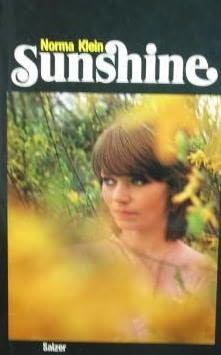 An oldie (first published in 1974, and now, sadly out of print) but still an amazingly effective weepie. Kate is a happy, hippie teenage mom back in the 70’s whose into peace, love and cute guitar players (like her adorable boyfriend Sam). He’s not the father of her sunny baby Jill, but he acts like it. Their lives are full of good friends, funny stories and songs, even though they’re super poor and Sam makes all their “bread” by playing in a bar. Then Kate falls down one day while giving Jill a bath–her leg just stops working. When she gets it checked out, she discovers she has a rare type of terminal bone cancer. Now Kate has a terrible decision to make–take brutal chemotherapy treatments that leave her nauseous and weak and may only extend her life by a few months, or ditch all the treatments and use the feel-good time she has left to be a real mom to her baby. Based on a true story of a young mother who used a tape player (pre-Camcorder-times) to record messages for her daughter to listen to after she was gone, Sunshine is one of my most favorite weepies ever because of Kate’s sincere, true voice and her Zen-like attitude about her own death. This is one I read over and over, wishing with all my heart that the ending were different. (4 weepies)
An oldie (first published in 1974, and now, sadly out of print) but still an amazingly effective weepie. Kate is a happy, hippie teenage mom back in the 70’s whose into peace, love and cute guitar players (like her adorable boyfriend Sam). He’s not the father of her sunny baby Jill, but he acts like it. Their lives are full of good friends, funny stories and songs, even though they’re super poor and Sam makes all their “bread” by playing in a bar. Then Kate falls down one day while giving Jill a bath–her leg just stops working. When she gets it checked out, she discovers she has a rare type of terminal bone cancer. Now Kate has a terrible decision to make–take brutal chemotherapy treatments that leave her nauseous and weak and may only extend her life by a few months, or ditch all the treatments and use the feel-good time she has left to be a real mom to her baby. Based on a true story of a young mother who used a tape player (pre-Camcorder-times) to record messages for her daughter to listen to after she was gone, Sunshine is one of my most favorite weepies ever because of Kate’s sincere, true voice and her Zen-like attitude about her own death. This is one I read over and over, wishing with all my heart that the ending were different. (4 weepies)
The Lovely Bones by Alice Sebold
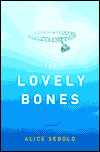 This may be the most unusual weepie I’ve ever read. At the beginning of the story, 14 year old Susie Salmon is already dead. She’s just been brutally murdered by a quiet serial killer in her 1970’s neighborhood, and now she’s in heaven watching the results of her death unfold down on earth. It’s painful for her to see her younger sister become older than Susie ever will, her parent’s marriage start to disintegrate as they grieve for her, and the first boy she ever kissed begin to grow up and forget her. Maybe worse is seeing Mr. Harvey, her murderer, continue to live contentedly in the house a block away from her parents, as the search for her killer tapers off and is finally closed. Susie finds that heaven doesn’t mean eternal happiness. But it helps that whatever you imagine becomes part of your own personal heaven, and for Susie, that means an ornate gazebo, a high school that is all extracurricular activities and no studying, and a gazillion dogs to play with and cuddle whenever she wants. Susie is terrified that her family will forget her. But until they learn to let her go they will never be healed. And neither will Susie. A contemplative weepie that will make you think and cry and then think some more. (3 weepies)
This may be the most unusual weepie I’ve ever read. At the beginning of the story, 14 year old Susie Salmon is already dead. She’s just been brutally murdered by a quiet serial killer in her 1970’s neighborhood, and now she’s in heaven watching the results of her death unfold down on earth. It’s painful for her to see her younger sister become older than Susie ever will, her parent’s marriage start to disintegrate as they grieve for her, and the first boy she ever kissed begin to grow up and forget her. Maybe worse is seeing Mr. Harvey, her murderer, continue to live contentedly in the house a block away from her parents, as the search for her killer tapers off and is finally closed. Susie finds that heaven doesn’t mean eternal happiness. But it helps that whatever you imagine becomes part of your own personal heaven, and for Susie, that means an ornate gazebo, a high school that is all extracurricular activities and no studying, and a gazillion dogs to play with and cuddle whenever she wants. Susie is terrified that her family will forget her. But until they learn to let her go they will never be healed. And neither will Susie. A contemplative weepie that will make you think and cry and then think some more. (3 weepies)
Hanging On to Max by Margaret Bechard
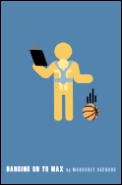 Sam Pettigrew is practically the only guy at his high school. That’s because it’s a special school for teen parents, and most of his classmates are girls. But Sam’s ex-girlfriend, Brittany decided that she couldn’t deal with a baby, so Sam, who couldn’t bear to see Max go live with strangers, decides to become both mom and dad. He strikes a hard bargain with his own single-parent father–Sam’s dad will help pay for Max’s needs so Sam can stay in school, but then super smart Sam has to sacrifice any hopes of college and engineering to work full-time with his dad to pay him back after he graduates. It’s incredibly hard being a full-time parent and student. Between classes and teaching Sam to drink out of a cup and get to sleep at a decent hour, there’s no time for friends, movies, or just plain relaxing. Sam is on 24 hours a day and it’s starting to catch up with him. When he lets his guard down for a minute, Max ends up in the emergency room, and Sam finally starts to question his choice. Was it really better to hang on to Max? Or should he have let him go to people who were more ready than he was to be a parent? This one you may read right up to the very last page without crying, but that last page is a killer. I started sobbing right on the subway.(1 weepie)
Sam Pettigrew is practically the only guy at his high school. That’s because it’s a special school for teen parents, and most of his classmates are girls. But Sam’s ex-girlfriend, Brittany decided that she couldn’t deal with a baby, so Sam, who couldn’t bear to see Max go live with strangers, decides to become both mom and dad. He strikes a hard bargain with his own single-parent father–Sam’s dad will help pay for Max’s needs so Sam can stay in school, but then super smart Sam has to sacrifice any hopes of college and engineering to work full-time with his dad to pay him back after he graduates. It’s incredibly hard being a full-time parent and student. Between classes and teaching Sam to drink out of a cup and get to sleep at a decent hour, there’s no time for friends, movies, or just plain relaxing. Sam is on 24 hours a day and it’s starting to catch up with him. When he lets his guard down for a minute, Max ends up in the emergency room, and Sam finally starts to question his choice. Was it really better to hang on to Max? Or should he have let him go to people who were more ready than he was to be a parent? This one you may read right up to the very last page without crying, but that last page is a killer. I started sobbing right on the subway.(1 weepie)
Girlhearts by Norma Fox Mazer
 Even though she and her mother are poor and live in a trailer, Sarabeth Silver is one happy camper. She has a great network of caring best friends, and her young mom (who had Sarabeth as a teenager) is like a sister, best friend and guardian angel all rolled into one. Then it all falls apart (like you knew it would–why else would it be on the tearjerker list??) Sarabeth’s mom, only 30 years old, dies suddenly from a freak heart attack, and just like that, all the light leaves Sarabeth’s life. Now she’s forced to stay with her mother’s best friend in a one-room apartment, where there’s no room for her between the woman’s hostile husband and their new baby. Confused and angry, Sarabeth feels completely trapped–until she remembers what her mother tried to forget–the family that disowned them both when they found out her mom was pregnant with Sara. Sarabeth has relatives that she’s never met, and perhaps a hopeful future, if she’s brave enough to go looking for it. (If you want to get to know Sarabeth from the beginning, read the prequel to Girlhearts, called Silver by Norma Fox Mazer, another of my favorite books. But you don’t have to read Silver first to love and cry over Sarabeth and her loss) (2 weepies)
Even though she and her mother are poor and live in a trailer, Sarabeth Silver is one happy camper. She has a great network of caring best friends, and her young mom (who had Sarabeth as a teenager) is like a sister, best friend and guardian angel all rolled into one. Then it all falls apart (like you knew it would–why else would it be on the tearjerker list??) Sarabeth’s mom, only 30 years old, dies suddenly from a freak heart attack, and just like that, all the light leaves Sarabeth’s life. Now she’s forced to stay with her mother’s best friend in a one-room apartment, where there’s no room for her between the woman’s hostile husband and their new baby. Confused and angry, Sarabeth feels completely trapped–until she remembers what her mother tried to forget–the family that disowned them both when they found out her mom was pregnant with Sara. Sarabeth has relatives that she’s never met, and perhaps a hopeful future, if she’s brave enough to go looking for it. (If you want to get to know Sarabeth from the beginning, read the prequel to Girlhearts, called Silver by Norma Fox Mazer, another of my favorite books. But you don’t have to read Silver first to love and cry over Sarabeth and her loss) (2 weepies)
Bringing Up the Bones by Lara M. Zeises
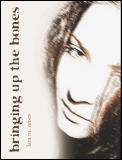 The only thing Bridget Edelstein ever wanted, more than a better relationship with her prima donna mother or perfect skin or a car that always started on cold mornings, was to be her best friend Benji’s girlfriend. So when she finally attained her goal and tasted the pure nirvana that was Benji’s kiss, it was incredibly crushing when he broke up with her to go to college across the country, but even more so when she heard he had been killed instantly in a car accident. Overwhelmed with grief, Bridget takes a year off from college, papers the walls of her studio apartment with pictures of Benji, and only leaves to go to her job as a waitress at an incredibly depressing truck stop. Enter Jasper, a very cute guy who gets off on wooing damsels in distress. Bridget thinks she might love him, except that Benji’s ghost keeps getting in the way. But when evidence surfaces that makes Bridget aware that perhaps Benji wasn’t the amazing person she thought he was, she wonders if its time to sever all romantic ties and get to know and love Bridget, first.A fantastic introspective weepie by the winner of the Delacorte Press Prize for a First Young Adult Novel, this story is all about character development. So if you one of those readers who is all about plot, this may not be the weepie for you. (1 weepie)
The only thing Bridget Edelstein ever wanted, more than a better relationship with her prima donna mother or perfect skin or a car that always started on cold mornings, was to be her best friend Benji’s girlfriend. So when she finally attained her goal and tasted the pure nirvana that was Benji’s kiss, it was incredibly crushing when he broke up with her to go to college across the country, but even more so when she heard he had been killed instantly in a car accident. Overwhelmed with grief, Bridget takes a year off from college, papers the walls of her studio apartment with pictures of Benji, and only leaves to go to her job as a waitress at an incredibly depressing truck stop. Enter Jasper, a very cute guy who gets off on wooing damsels in distress. Bridget thinks she might love him, except that Benji’s ghost keeps getting in the way. But when evidence surfaces that makes Bridget aware that perhaps Benji wasn’t the amazing person she thought he was, she wonders if its time to sever all romantic ties and get to know and love Bridget, first.A fantastic introspective weepie by the winner of the Delacorte Press Prize for a First Young Adult Novel, this story is all about character development. So if you one of those readers who is all about plot, this may not be the weepie for you. (1 weepie)
The Pain Tree and Other Teenage Angst-Ridden Poetry collected and illustrated by Esther Pearl Watson and Mark Todd
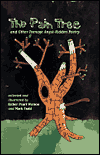 What it is: A collection of poetry by former and current teens, turned into a book by former ‘zine authors Watson and Todd. Short, (only 25 poems total) but so completely worth checking out, mostly for the amazingly cool/crude illustrations drawn by the eclectic compilers.
What it is: A collection of poetry by former and current teens, turned into a book by former ‘zine authors Watson and Todd. Short, (only 25 poems total) but so completely worth checking out, mostly for the amazingly cool/crude illustrations drawn by the eclectic compilers.
What it ain’t: Trite, silly or over-the-top. Yeah, some of this stuff isn’t quite Pulitzer material, but it rings very true to this prior teen, who looks back at her own teen poetry journals and blushes, madly!
Who will like it: Anyone dealing with the trials of adolescence right now, or having teen trauma flashbacks as an adult while lying on a therapist’s sofa.
A Sample: The Pain Tree by Mark Todd/Can’t you feel it?/It hurts so bad!/You can’t?/What’s wrong with you?/How come you can’t feel it?/I don’t believe you./What do you feel?/Nothing!/No pain?/Just nothing, huh?/Well, let me tell you,/You’re missin’ out./It’s wonderful.
I Wouldn’t Thank You for a Valentine: Poems for Young Feminists Edited by Carol Ann Duffy, illustrated by Trisha Rafferty
 What it is: Poems by women of different races and ages, arranged to document the female experience from youth ’til old age.
What it is: Poems by women of different races and ages, arranged to document the female experience from youth ’til old age.
What it ain’t: Despite the title, this isn’t pro-femi-nazi, man-hating stuff. (Sad to say, some of you still think the word “feminist” means that girls think they’re better than guys, and therefore hate their collective patriarchal guts. NO! It’s all about everyone getting equal pay for equal work–we should ALL be feminists, male or female!) It’s about being a girl and then a woman and all the stuff that is great about it, and, just to make it interesting, all the stuff that stinks about it.
Who will like it: Rrriot grrls who rock out to Tori Amos, Ani DiFranco and Liz Phair, and the boys who love them.
A Sample: Peck’s Bad Boys/Teacher called me a hussy/I told her I just wanted to be one of the guys/Their games more daring, longer-lasting/like an all-day sucker./Not fighting exactly/no back-biting, hair-pulling,/just out-front shin-kicking, punching/wrestling in the dirt/Rolling, maybe laughing/I told her I just liked the contact/all that hard muscle,/all those smells, dust, sweat, warm flesh./ Judi Benson
Listen Up! Spoken Word Poetry edited by zoe anglesey
 What it is: A collection of poems by nine masters of the spoken word form who perfected their art in the Brooklyn Moon Cafe and the Nuyorican Poets Cafe here in NYC. A short bio of each of these poets of color is followed by three or four samples of their work. Spoken word poetry kinda defies definition, but it’s a little like a story, a little like a song, and usually has a beat. It can be confrontational, contemplative, both, or neither.
What it is: A collection of poems by nine masters of the spoken word form who perfected their art in the Brooklyn Moon Cafe and the Nuyorican Poets Cafe here in NYC. A short bio of each of these poets of color is followed by three or four samples of their work. Spoken word poetry kinda defies definition, but it’s a little like a story, a little like a song, and usually has a beat. It can be confrontational, contemplative, both, or neither.
What it ain’t: the Beat poets of the 60’s! There’s still some finger snapping involved, but this modern spoken word is an organic kind of poetry that is still growing and evolving as an art form.
Who will like it: Anyone and everyone who digs the stylins’ and profilins’ of the spoken word form.
A Sample: Excerpt from Jessica Care Moore’s “Black Statue of Liberty”: I stand still above an island, fist straight in the air/Scar on my face, thick braids in my hair/Battle boots tied, red blood in the tears I’ve cried./Tourists fly from all over just to swim near my tide/Or climb up my long flight of stairs./But they trip on their shoe string lies./Piece by piece they shipped my body to this country/Now that I’m here, your people don’t want me./I’m a symbol of freedom, but I’m still not free/I suffer from class, race and gender inequality./
Movin’: Teen Poets Take Voice edited by Dave Johnson
 What it is: The cream of the crop of teen-penned poems collected from the terrific New York Public Library and Poets House teen program, Poetry in the Branches. Editor Dave Johnson led poetry workshops where teens could write/read/share their poetic endeavors. Johnson picked these 36 pieces to represent all the good stuff he heard.
What it is: The cream of the crop of teen-penned poems collected from the terrific New York Public Library and Poets House teen program, Poetry in the Branches. Editor Dave Johnson led poetry workshops where teens could write/read/share their poetic endeavors. Johnson picked these 36 pieces to represent all the good stuff he heard.
What it ain’t: Cheesy! This is sincere, from the heart poetry.
Who will like it: Wanna-be published, currently adolescent poets.
A Sample: Shoes/They’re my old men in rocking chairs,/spitting biographies into the sky./They’re gatherers of stories,/picking up the spit of kings,/the seats of beggars,/and the smell of babies/from crannies in the sidewalks/that glitter like a prostitute’s makeup/when the sun hits right./And the tales of the world,/in elegant calligraphy,/are written on their soles./–Ben Zeitlin
Truth & Lies: An Anthology of Poems edited by Patrice Vecchione
 What it is: A collection of poems by many different people (some you may recognize as a famous writer or philosopher) that illustrate the difference (and occasional similarities) between truth and untruth. Editor Patrice Vecchione writes in her introduction, “Poetry is a particular way of telling the truth…Often a poem will say what you know is true but had never heard put into words before.” It’s pretty deep and kind of interesting to read these poems and try and figure out why the editor chose them for this book, and how they all go together. Vecchione was also nice enough to include brief bios about the poets in the back of the book, so if you liked the voice of any particular person, you can dig in and find out where to find more of their works.
What it is: A collection of poems by many different people (some you may recognize as a famous writer or philosopher) that illustrate the difference (and occasional similarities) between truth and untruth. Editor Patrice Vecchione writes in her introduction, “Poetry is a particular way of telling the truth…Often a poem will say what you know is true but had never heard put into words before.” It’s pretty deep and kind of interesting to read these poems and try and figure out why the editor chose them for this book, and how they all go together. Vecchione was also nice enough to include brief bios about the poets in the back of the book, so if you liked the voice of any particular person, you can dig in and find out where to find more of their works.
What it ain’t: No poetry in here by teens, folks. Just poems by professional and classical writers that adults thought you would like, and that may start your own writing wheels spinning.
Who will like it: Razor-red lipstick wearing Goth girls who sneak copies of Emily Dickinson into their black-light lit bedrooms, and boys who play in serious bands (and I don’t mean Making the Band, gelled-hair poptarts!) who are looking for inspiration for their deep-down, soul searching lyrics.
A Sample: An excerpt from Julia Alvarez’s “from 33”: Sometimes the words are so close I am/more who I am when I’m down on paper/than anywhere else as if my life were/practising for the real me I become/unbuttoned from the anecdotal and /unnecessary and undressed down/to the figure of the poem, line by line,/the real text a child could understand/
You Hear Me?: Poems and Writing by Teenage Boys edited by Betsy Franco
 What it is: Uncensored, untouched, raw and real poetry by the usually silent half of the teenage population–guys. Editor and mom Betsy Franco decided early on that she wouldn’t try to push these poems into “themes” or “meanings,” but let them speak for themselves. And do they ever! There’s rash, brash, tender and moving poetry here from guys of all ages and from all over.
What it is: Uncensored, untouched, raw and real poetry by the usually silent half of the teenage population–guys. Editor and mom Betsy Franco decided early on that she wouldn’t try to push these poems into “themes” or “meanings,” but let them speak for themselves. And do they ever! There’s rash, brash, tender and moving poetry here from guys of all ages and from all over.
What it ain’t: Completely G-rated. You may stumble upon a few, umm, maturely themed poems. This may be great, or terrible, depending on your age and point of view!
Who will like it: Guys who swear they hate poetry and can’t understand it, and the girls who love them. <
A Sample: An untitled piece by Marcel Mendoza, age 16: Just because I love darkness/Doesn’t mean I’m depressed/Doesn’t mean I can’t love/Doesn’t mean I’m blind./Just because I love my Mom/Doesn’t mean I’m not a rebel/Doesn’t mean I can’t love others/Doesn’t mean I’m a mama’s boy./Just because I act psycho/Doesn’t mean I need medication/Doesn’t mean I can’t be compassionate/Doesn’t mean I don’t cry./
What Have You Lost? Poems selected by Naomi Shihab Nye, photographs by Michael Nye
 What it is: A cool conceptual book of poetry that strives to answer the title question. Editor Naomi Shihab Nye chose poems about losing something, be it a real physical thing, or something ephemeral like freedom or innocence. But it’s not all sad and hopeless, some poems talk about the windows that open when the door of loss closes. Strategically placed black and white photos of people of different ages and races studying the camera with hard to read expressions add to the power of this interesting collection.
What it is: A cool conceptual book of poetry that strives to answer the title question. Editor Naomi Shihab Nye chose poems about losing something, be it a real physical thing, or something ephemeral like freedom or innocence. But it’s not all sad and hopeless, some poems talk about the windows that open when the door of loss closes. Strategically placed black and white photos of people of different ages and races studying the camera with hard to read expressions add to the power of this interesting collection.
What it ain’t: Hard to understand. Anyone can relate to what it feels like to lose something. We all have lost something important to us, and it’s usually a moment we never forget.
Who will like it: Just about anyone, but especially crunchy granola girls, sensitive pony-tail guys, and aspiring photographers.
A Sample: Teenagers/One day they disappear/into their rooms./Doors and lips shut/and we become strangers in our own home./I pace the hall, hear whispers,/a code I knew but can’t remember,/mouthed by mouths I taught to speak./Years later the door opens./I see faces I once held,/open as sunflowers in my hands. I see/familiar skin now stretched on long bodies/that move past me/glowing almost like pearls./ –Pat Mora